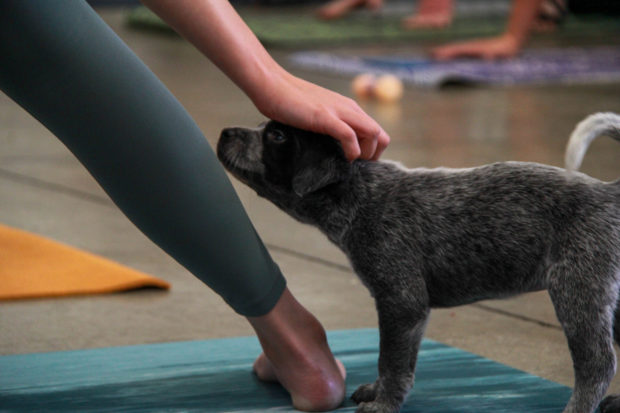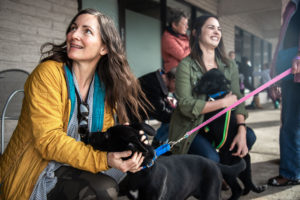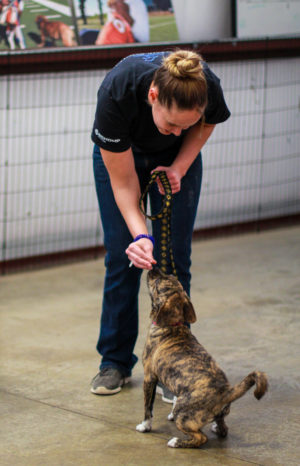Socializing Your Puppy: When and How to Make a Lasting Impact on Your Dog’s Behavior
FEBRUARY 12, 2019

Bringing a new puppy into your family is an exciting time. Along with house training and getting an early start on manners training, socializing your puppy ensures that you’re giving your new family member a great head start.
Why It’s Important to Socialize Your Puppy
Socializing your puppy is a critical step for positive development. A lack of early socialization is the leading causes of behavioral problems in dogs, and poor socialization early on leads to fear, shyness or aggression toward new people and animals.
The purpose of socialization is to help expose your puppy to all kinds of sights, sounds and smells in a positive way. Proper socialization can prevent a dog from being fearful of children, reacting aggressively when meeting other dogs or avoiding riding in the car. Ultimately, the goal is to help your puppy become a well-mannered, happy companion who is unafraid of the world around him.
When the critical window of socialization is missed, it becomes much harder to work with your dog and desensitize them to new experiences. You’ll never be able to make as significant of an impact in your dog’s life as you can during puppyhood, and some dogs that miss out during this time never fully recover.
When Should You Socialize Your Puppy?
According to the American Kennel Club, the best time to socialize your puppy is from 7 weeks to 4 months old. During this time, puppies go through a socialization period that permanently shapes their future personality and how they will react to things in their environment as an adult.
Health Concerns
Most young puppies are not fully protected against disease until they’ve had all their puppy shots. But if your wait until your puppy has all his shots before socializing him, you’ll miss that critical window.
The good news is that if you take some commonsense precautions while socializing your puppy, the risk of infection is quite small compared to the much larger risk of your puppy developing serious behavior problems with fear and aggression later in life. According to the American Veterinary Society of Animal Behavior, “behavioral issues, not infectious diseases, are the number one cause of death for dogs under three years of age.”
But remember, puppies should not be taken to the dog park until they receive their full series of vaccinations. Instead, keep socialization limited to cleaned spaces such as puppy classes, where the risk of infection is much lower.

Tips for How to Socialize Your Puppy
Introduce your puppy to new things: To a puppy, the whole world is new, strange and unfamiliar. New sights, new smells and new friends are everywhere! And each encounter is an opportunity to make a new, positive association for your puppy. Try to introduce your puppy to as many different types of people, places, noises and textures as you can. Simple things, like having him walk on different types of surfaces – carpet, hardwood or tile – and introduce him to people who look different, both physically and wearing different types of clothes. Think: Old, young, short, tall, different skin colors, baggy clothes, hats, sunglasses, wheel chairs, etc. The more your puppy is exposed to early on, the less surprised he’ll be when he is older.

Make every interaction positive: The best way to keep it friendly and positive is to include plenty of treats and praise so that your puppy associates what he’s being exposed to and the feeling of experiencing something new as a fun thing. Keep in mind that dogs can read our emotions, so if you’re nervous introducing your puppy to something new, your puppy will be nervous, too.
Involve new people: By having different people taking part in the socialization process, you’re continuously taking the puppy out of his comfort zone, letting him know that he’ll be okay experiencing something new, no matter who he is with.
Take everything one step at a time: Try to avoid overwhelming your puppy by doing too much too fast. Take the socialization process slowly to give you puppy a chance to adjust. You want to avoid exposing him to too much too quickly, resulting in a fear response in the future.
Explore public spaces: Once your puppy is used to the small amounts of stimuli, it’s time to move outside of his comfort zone and expand the amount of new experiences he’ll have. After he’s started his vaccination series, take him to a pet shop or to a friend’s house for a puppy play date. Talk to your veterinarian to decide when it’s safe to take your puppy to the dog park and be sure to follow the dog park’s rules and safety protocol when doing so.
Sign up for a local puppy class: Once your puppy has started his vaccinations, you should also look into puppy classes – training classes designed specifically to socialize and instill a good training foundation for your pup. He’ll learn basic commands and get valuable exposure to other dogs and people.
Beyond the Puppy Years: Training Classes at HSSPV
Whether you’ve adopted a new puppy or found a slightly older companion at a shelter, you can take steps to help your new family member engage with the world in a positive way. This is best done through training classes with a certified and trusted trainer using positive training methods.
According to the American Kennel Club, “Dogs that are trained using positive methods learn to enjoy training and develop an eagerness to please. Positive methods also foster trust and communication between owner and dog, leading to a stronger bond.”
At the Humane Society of South Platte Valley, we offer a series of positive training classes designed to give your dog every opportunity to be the best companion they can be.
We offer both group training and private classes taught by our highly experienced and certified trainer. Learn more about our training classes and behavior services.
If you are interested in joining our 6-week group training class or scheduling private behavior training, we encourage you to reach out to behaviorandtraining@hsspv.org today.
